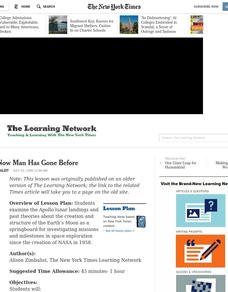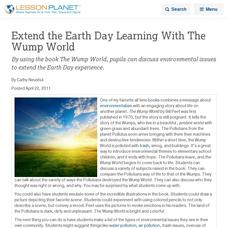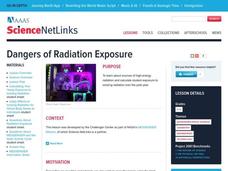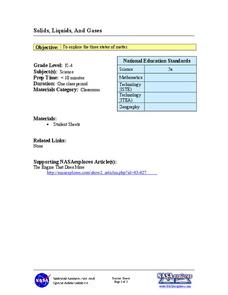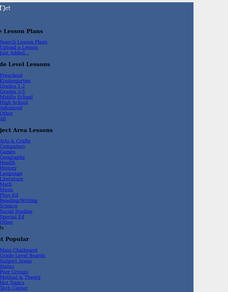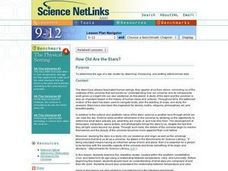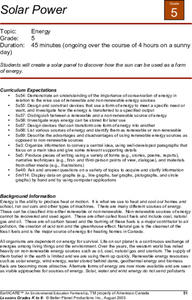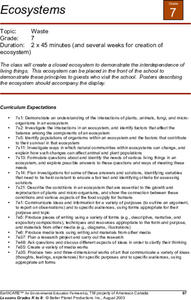Curated OER
Earth Day
In this Earth Day worksheet, students complete activities such as reading a passage, matching phrases, fill in the blanks, choose the correct word, multiple choice, unscramble the words, sequencing, unscramble the sentences, write...
Curated OER
Investigating the Hydrosphere
No matter the scientific discipline, your students can benefit from a study of water.
Curated OER
Where Now Man Has Gone Before
Students examine the Apollo lunar landings and past theories about the creation and structure of the Earth's Moon as a springboard for investigating missions and milestones in space exploration since the creation of NASA in 1958.
Curated OER
Extend the Earth Day Learning With "The Wump World"
By using the book "The Wump World," students can discuss environmental issues and extend the Earth Day experience.
Curated OER
Dangers of Radiation Exposure
Students calculate their yearly exposure rate to harmful high-energy radiation and cumulative effects over time. They use the information to evaluate the various sources of radiation that are of greatest concern for them.
Curated OER
Sunny Delight
First graders explore completing experiments through the scientific method.
Curated OER
Solids, Liquids, and Gases
Students investigate and explore the three states of matter. They read and discuss the NASA article "The Engine That Does More," identify examples of each state of matter, and as a class complete a section of two worksheets. They...
Curated OER
Endangered Species !: Why Are Species Endangered?
Young scholars explore the various issues and problems faced by endangered species globally. They research the plight of endangered species, create a poster of a selected animal, and present their poster and research to the class.
Curated OER
The Sun
Middle schoolers draw diagram of sun and its layers, including photosphere, chromosphere, corona, convection and radiative zones, and core. Students then describe each layer in their own words, define sun spot cycle, and describe solar...
Curated OER
The Living Earth
Students discuss glaciers and write a definition for a glacier as a class. After discussion, they participate in an activity that demonstrates how glaciers can cause dramatic changes and create new landforms. Groups discuss their...
Curated OER
Cooperative Learning, Sci., Tech., Lang
Students research, write, edit, revise and present a paragraph, using word processor, about animal of their choice, including description, where animal lives, what it eats, its habits, e.g. is it endangered, migration, hibernation,...
Curated OER
The Sky Jeopardy
First graders reinforce concepts about sun, moon, day, night and sky by playing the Sky Jeopardy game. In the end, 1st graders get to nibble crackers in order to show the different phases of the moon.
Curated OER
The Energy Grab Game
Eighth graders explore the scarcity of energy resources. They also explore the competition for natural resources and the inadequate distribution of natural wealth among the Earth's nations.
Curated OER
World Hepatitis Day
In this World Hepatitis Day activity, learners complete activities including reading a passage, matching phrases, fill in the blanks, correct word choosing, multiple choice, sequencing, unscramble the sentences, write questions, take a...
Curated OER
Ecosystem In A Bottle
Ecosystem activities show how everyone and everything is interconnected. The smallest change can make a big impact.
Curated OER
How Old Are the Stars?
High schoolers determine the age of a star cluster by observing, measuring, and plotting astronomical data. They examine the Jewe lbox cluster, located within the southern constellation Crux and determine its age.
Curated OER
Solar Power
Fifth graders create their own solar panel. They use this experiment to see how the sun can be used as a form of energy.
Curated OER
Ecosystems
Seventh graders create a closed ecosystem and place it where is it visible to others in the school. They label it with posters describing the interdependence of living things in the ecosystem. They discuss what might happen to the...
Curated OER
Sun and Moon Folktale
Learners become familiar with characteristics of folktales by reading or listening to African folktale that explains why sun and moon live in the sky. Students then create their own folktales about the sun and moon or another aspect of...
Curated OER
Weather
Students recognize that carbon dioxide's role in the greenhouse effect. They research the greenhouse effect to design and create a greenhouse structure to measure the changing temperatures over a 24-hour period. In addition, they write a...
Curated OER
The Way to Venezuela
Students investigate various facets of Venezuelan culture, politics, history and current events to develop an introductory chapter of a guidebook to the country.
Curated OER
ABCs of Endangered Species
Students create an ABC Book of Endangered Animals that includes locator maps, "fast facts," and explanations about why those animals are endangered.
Curated OER
Water Works Wonders
Students examine where water is found in the world, how we use it, and the various forms it takes. They observe the refraction of light through a prism, record the day and night sky over a week's time, and create a topographic model of...




